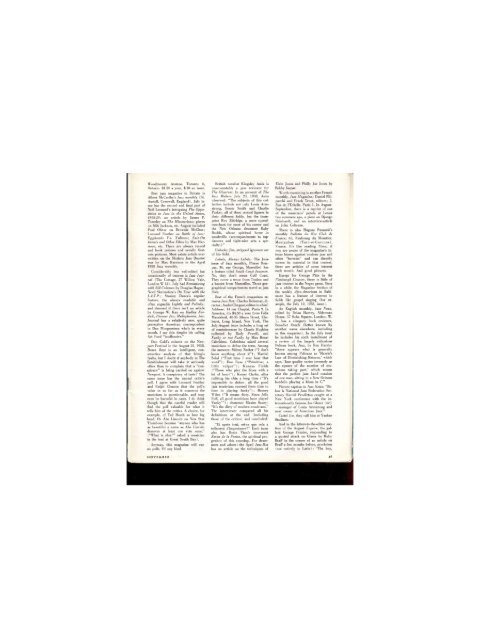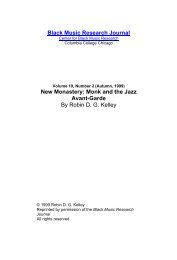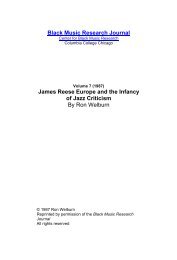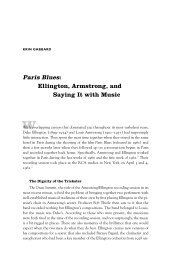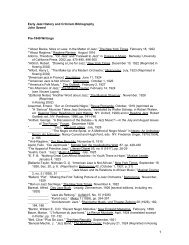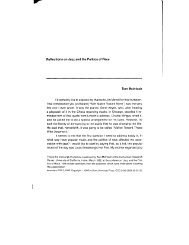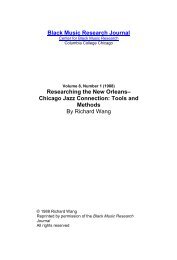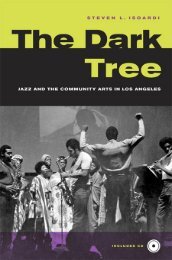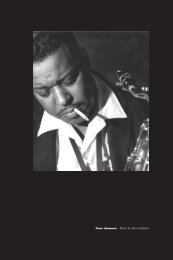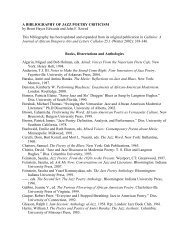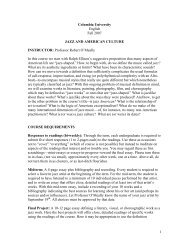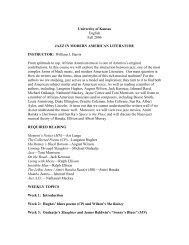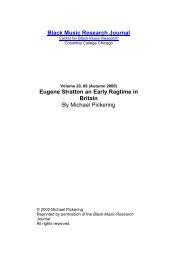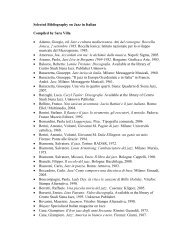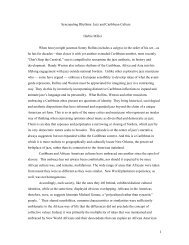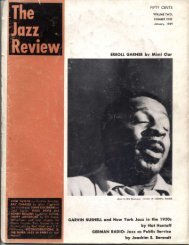The Jazz Review - Jazz Studies Online
The Jazz Review - Jazz Studies Online
The Jazz Review - Jazz Studies Online
Create successful ePaper yourself
Turn your PDF publications into a flip-book with our unique Google optimized e-Paper software.
Woodmouny Avenue, Toronto 6,<br />
Ontario. $1.20 a year, $.10 an issue.<br />
Best jazz magazine in Britain is<br />
Albert McCarthy's <strong>Jazz</strong> monthly (St.<br />
Austell, Cornwall, England). July is¬<br />
sue has the second and final part of<br />
Neil Leonard's intriguing <strong>The</strong> Opposition<br />
to <strong>Jazz</strong> in the United States,<br />
1918-29; an article by James P.<br />
Townley on <strong>The</strong> Missourians; pieces<br />
on Milt Jackson, etc. August included<br />
Paul Oliver on Brownie McGhee;<br />
Leonard Feather on Battle of <strong>Jazz</strong>:<br />
Eggheads Vs. Yahoos; Sait-On<br />
Jamais and Other Films by Max Harrison<br />
etc. <strong>The</strong>re ii t<br />
always record<br />
and book reviews and usually firstrate<br />
pictures Most astute article<br />
written on the Modern <strong>Jazz</strong> Quartet<br />
was by Max Harrison in the April<br />
1958 <strong>Jazz</strong> monthly<br />
Considerably less welbedited but<br />
occasionally of interest is <strong>Jazz</strong> Journal<br />
(<strong>The</strong> Cottage, 27 Willow Vale,<br />
London W 12). July had Reminiscing<br />
with Bill Coleman by Douglas Hague;<br />
Nevil Skrimshire's On Tour with the<br />
J.A.T.P.; Stanley Dance's regular<br />
feature, the always readable and<br />
often arguable Lightly and Politely;<br />
and damned if there isn't an article<br />
by George W. Kay on Dudley Fosdkk,<br />
Pioneer <strong>Jazz</strong> Mellophonist. <strong>Jazz</strong><br />
Journal has a relatively new, quite<br />
perceptive American correspondent<br />
in Dan Morgenstern who's in every<br />
month I sav this desoite his calling<br />
Art Ford "inoffensive!''<br />
Don Gold's column on the Newport<br />
Festival in the August 21, 1958,<br />
Down Beat is an intelligent, constructive<br />
analysis of that blimp's<br />
faults, but I doubt if anybody in <strong>The</strong><br />
Establishment will take it seriously<br />
other than to complain that a "conspiracy"<br />
is being carried on against<br />
Newport. A conspiracy of taste? <strong>The</strong><br />
same issue has the annual critic's<br />
poll. I with Leonard Feather<br />
and Ralph Gleason that the poll's<br />
value in so far as it concerns the<br />
musicians is ourstiomlile and may<br />
even be harmful in cases.'i do think<br />
though that the careful reader will<br />
find the poll valuable for what it<br />
tells him of the critics A choice for<br />
example, oi tea neam as nesi nig<br />
band Or Abe T incoln on New Star<br />
TrnmhoL h PL,se "anvrL whr, has<br />
« r«,,lWnl , « Arl liLrT<br />
Z^ZelTt 1 Je tl n l ^<br />
oeserves at lea^st one vote once.<br />
• ?u • 1. T r ? T l l ! n T<br />
in the tent at Great South bay).<br />
Anyway, this magazine will run<br />
no polls. Of any kind.<br />
British novelist Kingsley Amis is<br />
unaccountably a jazz reviewer for<br />
<strong>The</strong> Observer. In an account of <strong>The</strong><br />
<strong>Jazz</strong> Makers July 20, 1958, Amis<br />
observed: "<strong>The</strong> subjects of this collection<br />
include not only Louis Armstrong,<br />
Bessie Smith and Charlie<br />
Parker, all of them central figures in<br />
their different fields, but the trumpeter<br />
Rov Eldridge a mere squeal-<br />
merchant for most of his C 1 rii reer and<br />
the New Orleans drummer Baby<br />
Dodds whose soiritual home is<br />
vaudeville (accompaniments to tan<br />
dancers and tight wire acts a spe¬<br />
cialty.)"<br />
Unlucky Jim, stripped ignorant out<br />
of his field.<br />
Labels, Always Labels: <strong>The</strong> June<br />
issue of <strong>Jazz</strong> monthly, Pierre Bompar,<br />
36, rue George, Marseille) has<br />
a feature titled South Coast <strong>Jazz</strong>men.<br />
No, they don't mean Gulf Coast.<br />
<strong>The</strong>y cover a tenor from Toulon and<br />
a bassist from Marseilles. Those geographical<br />
compartments travel as jazz<br />
does.<br />
Best of the French magazines remains<br />
<strong>Jazz</strong>-Hot; Charles Delaunay, director<br />
; Andre Clergeat, editor-in-chief.<br />
Address: 14 rue Chaptal, Paris 9. In<br />
America, it's $4.50 a year from Felix<br />
Manskleid, 40-35 Ithaca Street, Elmhurst,<br />
Long Island, New York. <strong>The</strong><br />
July-August issue includes a long set<br />
of reminiscences by Claude Hopkins<br />
collected by Rudy Powell; and<br />
Funky or not Funky by Max' Henri<br />
Cabridens. Cabridens asked several<br />
musicians to define the term. Among<br />
the Answers" Sidney Bechet ("I don't<br />
know anything about it") • Martial<br />
Solal ("First time I ever hear that<br />
word"') • Don Rvas ("Primitive- a<br />
little vulgar") Kansas Fields<br />
("Those who play the blues with a<br />
lot nf hpnrt"l • Kpnnv Clarkp after<br />
InhhiJhil Mr, 7lL«t,meW*<br />
jazz musicians succeed trom time<br />
I, " y g , f c- T II<br />
IMI II M E A N S , D M ^ 5 M C E<br />
Koll alt good musicians have played<br />
* J- . U I ? M E R A M A X I M .. U R Y ,;<br />
It s the dirty of modern musicians.<br />
Ine interviewer compared all his<br />
definitions at the end (including<br />
those of the critics) and concluded:<br />
"Et apres tout, est-ce que cela a<br />
tellement d'importance?" Each issue<br />
also has Boris Vian's irreverent<br />
Revue de la Presse, the spiritual progenitor<br />
of this roundup. For drummers<br />
and others: the April <strong>Jazz</strong>-Hot<br />
has an article on the techniques of<br />
Elvin Jones and Philly Joe Jones by<br />
Bobby Jaspar.<br />
Worth examining is another French<br />
monthly, <strong>Jazz</strong> Magazine; Daniel Filipacchi<br />
and Frank Tenot, editors; 3,<br />
Rue de 1'Echelle, Paris 1. In August-<br />
September, there is a reprint of one<br />
of the musicians' panels at Lenox<br />
two summers ago, a piece on Django<br />
Reinhardt. and an interview-article<br />
on John Coltrane.<br />
<strong>The</strong>re is also Hugues Panassie's<br />
monthly Bulletin du Hot Club de<br />
France, 65, Faubourg du Moustier,<br />
Montauban (Tarn-et-Garonne),<br />
France. It's like reading Time; if<br />
you are aware of the magazine's intense<br />
biases against modern jazz and<br />
other "heresies" and can thereby<br />
screen its material in that context,<br />
there are articles of some interest<br />
each month. And good pictures.<br />
Except for George Pitts in the<br />
Pittsburgh Courier, there is little of<br />
jazz interest in the Negro press. Once<br />
in a while, the Magazine Section of<br />
the weekly A fro-American in Baltimore<br />
has a feature of interest in<br />
fields like gospel singing (for example,<br />
the July 12, 1958, issue).<br />
An English monthly, <strong>Jazz</strong> News,<br />
edited by Brian Harvey, Alderman<br />
House, 37 Soho Square, London, W.<br />
1., has a vinegary book reviewer,<br />
Benedict Osuch (better known by<br />
another name elsewhere, including<br />
in this magazine). In the July issue<br />
he includes his sixth installment of<br />
a review of the largely ridiculous<br />
Pelican book, <strong>Jazz</strong>, by Rex Harris:<br />
"there appears what is generally<br />
known among Pelicans as 'Harris's<br />
Law of Diminishing Returns,' which<br />
says, '<strong>Jazz</strong> quality varies inversely as<br />
the square of the number of musicians<br />
taking part' which means<br />
that the perfect jazz band consists<br />
of one man sitting in a New Orleans<br />
bordello playing a blues in C "<br />
Picture caption in <strong>Jazz</strong> News: "Below<br />
is National <strong>Jazz</strong> Federation Sec¬<br />
retary Harold Pendleton caught at a<br />
New York conference with the internationally<br />
famous Joe Glazer (sic)<br />
— manager of Louis Armstrong and<br />
near owner of American <strong>Jazz</strong>."<br />
Cartel Joe, they call him at Yankee<br />
Stadium.<br />
And in the letters-to-the-editor section<br />
of the August Esquire, the gallant<br />
George Frazier, responding to<br />
a quoted attack on Glaser by Ruby<br />
Braff in the course of an article on<br />
BrafT a few months before, proclaims<br />
(not entirely in Latin): "<strong>The</strong> boy,


